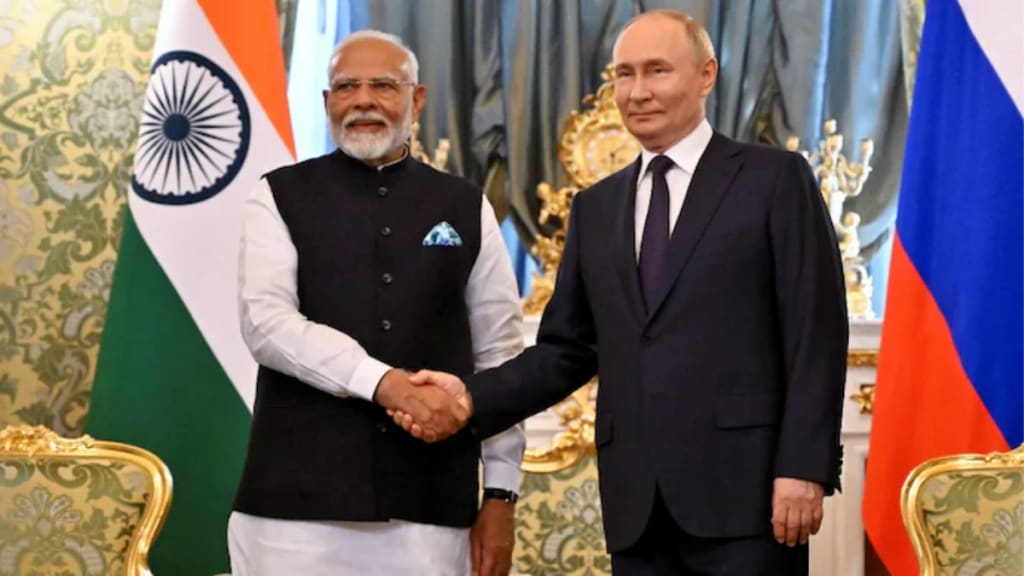A high-level delegation from the Indian Embassy in Russia recently completed a two-day visit to key Russian nuclear facilities, underscoring the deepening energy cooperation between the two countries. The delegation, which included Nikhilesh Giri, Deputy Chief of Mission at the Indian Embassy, Vivek Singha, First Secretary, and Swapnil Srivastava, Head of the Nuclear Power Corporation of India Limited (NPCIL) Representative Office in Russia, visited the Izhora plant and Leningrad Nuclear Power Plant (NPP), two critical sites in Russia’s nuclear energy infrastructure.
This visit follows important discussions held earlier this year in both Russia and Mumbai, where India and Russia reviewed their ongoing nuclear energy projects and explored further avenues for collaboration, particularly in nuclear plant construction in India.
A Closer Look at Russian Nuclear Infrastructure
The delegation’s visit to the Izhora plant, part of Rosatom’s Machine-Building Division, provided an opportunity to inspect facilities where vital equipment for nuclear power plants is produced. The Izhora complex is integral to Russia’s nuclear energy capabilities, manufacturing key components for nuclear power stations globally. Over the last two decades, the plant has delivered more than ten complete sets of equipment for nuclear power plants and numerous large-sized components for the oil and gas sector.
The delegation also visited the Leningrad NPP, one of Russia’s largest nuclear plants, with an installed capacity of 4,400 MW. The Leningrad plant is unique in its use of two different types of reactors: the RBMK-1000 reactors (uranium-graphite channel-type reactors) and the more modern VVER-1200 reactors (pressurized water reactors). These reactors are among the most advanced in Russia, and the plant’s ongoing upgrades with additional VVER-1200 reactors demonstrate Russia’s leadership in next-generation nuclear energy technology. The Indian delegation expressed its appreciation for the technological advancements showcased at Leningrad NPP and its successful operations.
Kudankulam Nuclear Power Project: A Cornerstone of Bilateral Cooperation
One of the most significant areas of collaboration between India and Russia in the nuclear sector is the Kudankulam Nuclear Power Project in Tamil Nadu, India. The ongoing construction of Units 3 and 4, and the upcoming Units 5 and 6, is a major bilateral endeavor that promises to boost India’s nuclear energy capacity. These units are being built with VVER-1000 reactors and meet stringent International Atomic Energy Agency (IAEA) safety standards.
The success of the first two operational units at Kudankulam has paved the way for further nuclear energy projects, with both sides committed to completing the remaining units on time. During a recent meeting between Indian Prime Minister Narendra Modi and Russian President Vladimir Putin, both leaders reiterated the importance of energy cooperation, particularly nuclear power, in advancing India’s energy security. They agreed to maintain close coordination to ensure the timely installation of the remaining units at Kudankulam, reinforcing the strategic nature of this collaboration.
Strengthening Bilateral Energy Ties
The Indian delegation’s visit closely follows the discussions held earlier in November 2024 during the 25th session of the India-Russia Intergovernmental Commission on Trade, Economic, Scientific, and Technological Cooperation (IRIGC-TEC). Russian First Deputy Prime Minister Denis Manturov, who visited India for the session, emphasized the growing cooperation between the two countries in areas such as nuclear energy, trade, hydrocarbons, agriculture, and technology. Energy cooperation, including the construction of nuclear plants, was a major focus, with both sides agreeing to continue strengthening their nuclear ties.
This visit also highlights the broader energy relationship between India and Russia, where nuclear energy plays a central role in addressing India’s growing energy needs. With both countries increasingly looking toward low-carbon and sustainable energy sources, the nuclear sector provides an essential avenue for cooperation in the fight against climate change.
Rosatom’s Global Role
Rosatom, Russia’s state-owned nuclear corporation, continues to be a global leader in nuclear energy development. With a portfolio that includes 39 nuclear reactors under construction across 10 countries, Rosatom is at the forefront of advancing nuclear energy technology. The company is not only the largest producer of low-carbon electricity in Russia but also plays a key role in the global nuclear market, with projects spanning multiple continents.
For India, Rosatom’s expertise is invaluable in meeting its ambitious energy targets. With nuclear power projected to play a significant role in India’s energy future, the ongoing partnership with Rosatom is crucial in ensuring a stable, safe, and sustainable energy supply.
Looking Ahead
The visit of Indian representatives to Russian nuclear facilities marks a significant milestone in the ongoing energy cooperation between the two countries. As India continues to expand its nuclear energy capacity, the expertise and experience of Rosatom will be critical in ensuring the safe and efficient operation of nuclear power plants across the country. The growing collaboration between India and Russia not only strengthens bilateral ties but also plays a crucial role in meeting India’s energy needs while contributing to global efforts to combat climate change.
This partnership is set to expand further in the coming years, with both countries committed to continuing their collaboration in nuclear energy, ensuring a sustainable and secure energy future for both nations.

